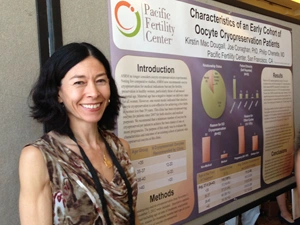
PCRS Update: Kirstin's Poster
Another overview of one of the posters PFC presented at PCRS this year:
At PFC, there has been a steadily increasing interest in fertility preservation which includes both egg and embryo freezing. The American Society for Reproductive Medicine (ASRM) at the end of 2012 endorsed oocyte cryopreservation as a standard practice for fertility preservation. Some research has suggested that elective egg freezing is a cost-effective method for achieving a future live birth for women under age 39, compared to the possibility of undergoing IVF at a later time in life. PFC has been cryopreserving oocytes for women since 2007 to preserve their fertility for both medical and non-medical purposes. To better understand these trends we looked at egg freezing patterns in our clinic from 2009 to 2012.
Nearly 100 women cryopreserved oocytes during that three-year period. Most (87%) froze their eggs for non-medical reasons such as work or relationship while fewer (13%) froze their eggs for medically-related reasons; e.g. preserving fertility prior to chemotherapy treatment. While almost 15% were married or partnered, the majority of women freezing eggs reported being single. On average women were 37.4 years old at the time of egg freezing and their ages ranged from 24-43 years.
At PFC we recommend that a minimum number of oocytes be cryopreserved for each woman according to her age to achieve the best chance of one or more future pregnancies. On average, women under 35 were able to preserve the recommended number of eggs after one cycle. Women over the age of 35 who completed one to two egg freezing cycles typically preserved the recommended number.
A small number of women (10%) created and froze embryos at the same time as egg freezing or during separate treatments. Another 10% of women preserving fertility also chose to attempt pregnancy during or close to the time when they froze their eggs. Nearly all women electing fertility preservation have continued to store their eggs and/or embryos since they were initially cryopreserved between one and four years ago.
It appears that women were freezing eggs when they were not yet ready to have their first child for medical or non-medical reasons, or when they wanted to preserve their ability to expand their families in the future. More research needs to be done to better understand the goals and needs of women who choose fertility preservation.
- Kirstin Dougall, Research
Categories
About the Blog
Welcome to the Pacific Fertility Center Blog! Nationally and internationally recognized for providing exceptional reproductive care, our team believes in empowering people with the knowledge they need to navigate their unique fertility journeys.
From information on the latest fertility treatments to valuable insights on egg donation, surrogacy, and everything in between, the Pacific Fertility Center Blog is your ultimate resource for all things reproductive care and support. Read on to learn more, and contact us today if you have any questions or want to schedule a new patient appointment.

